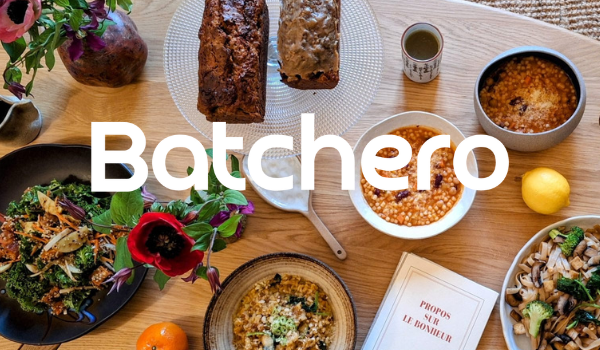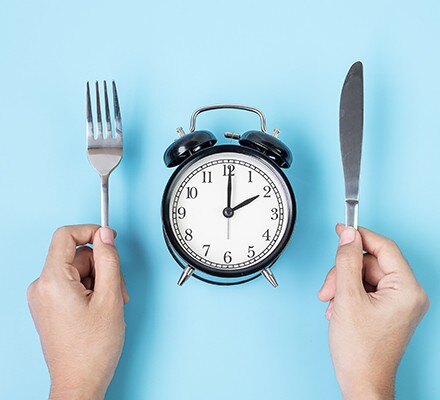Why did we start Batchero?
Making healthy home cooking convenient by putting a private chef in the pocket of the many.
READING TIME: ABOUT 10-15min. Yes, it's a long story...
It all started on a Monday evening around 7:15 pm, in front of my fridge, after a long day at work and picking up my son from school.

I gazed at the almost empty interior of my fridge for several long minutes. Exhausted at the thought of having to come up with an idea, go out shopping, then cook for at least half an hour, and prepare yet another meal. I already imagined the alternatives, sushi or pizza? Takeaway or delivery? Do I have a ready meal in the freezer? If not, pasta? I'm exhausted, my son is exhausted, we don't want to go out... tonight it will be delivered pizza... cold... with a pinch of guilt. I know it's not very good but ultimately it will be the simplest. We'll do better tomorrow.
Maybe.
This scene is one many of us experience every day, it seems to me.
At around 12:45 am, the Batchero idea hits.

Why is it so easy to have pizzas, sushi, and burgers delivered in 30 minutes via a mobile app, but not homemade, healthy, and balanced meals? Why can't my basket of vegetables come with a cook? Aren't there cooks nearby who could buy vegetables and then come to cook at my home for the week?
That very morning, Batchero was born.
At least in its broad outlines:
- A mobile app to put a private chef in the pocket of the many and allow booking in just 2 clicks.
- Healthy dishes made from raw, organic, and good ingredients.
- Weekly menus, so you no longer have to think about it every day, find a fridge full of delicious meals, eliminate guilt, and make the service as accessible as possible.
- A service that cares for its clients and its cooks.
- An ambition: to bring homemade cooking back to the table for the many.
Our food system is fundamentally dysfunctional.
This scene, so familiar to many of us, made me realise a troubling truth: our food system is fundamentally dysfunctional.
We live in an era where convenience has triumphed over quality. Where the choice often boils down to sacrificing our health to save time, or dedicating precious hours to preparing good meals. This daily dilemma led me to a simple question: why must we choose?
This is how Batchero was born. Not just as a delivery service, but as a comprehensive response to a failing system and a vision for a better future.
The problem: a food system in crisis
The food industry fails us.
The statistics are alarming. Obesity has tripled in all European countries over the past 40 years. Sales of ultra-processed foods are skyrocketing while the time spent cooking is inexorably decreasing. This is no coincidence. The less we cook, the more we rely on pre-prepared industrial meals. And the more we consume them, the less we cook.
In terms of production: unsustainable agricultural practices are the norm.
At the core of the food system lies industrial agriculture, which prioritises quantity over quality. Intensive monocultures deplete the soil, requiring ever more chemical fertilisers and pesticides. Livestock are confined in often deplorable conditions, fed antibiotics to compensate for their lack of living conditions.
This agricultural overproduction is paradoxical: it simultaneously creates waste and scarcity. Farmers, caught in a system that pushes them to produce more for less, are often the first victims of this model. Biodiversity collapses, pollinating insects disappear, and agricultural practices contribute massively to climate change.
And all this for what?
To throw away a third of food production; a large-scale waste.
Food Processing: A Logical Degradation of Ingredient Quality
Ultra-processed foods are designed in laboratories to maximise appeal and shelf life, not nutritional quality.
The food industry cleverly manipulates the sugar-salt-fat trio to create genuine food addiction. Additives multiply: flavour enhancers, colourings, emulsifiers, preservatives... A single product can contain more than 30 ingredients, most of which have no nutritional value. Foods are gradually stripped of their essential nutrients, then artificially "enriched" to give the illusion of a balanced diet.
The consequences for our health are disastrous: diabetes, cardiovascular diseases, cancers, digestive disorders, and even impacts on our mental health. Science increasingly demonstrates the links between ultra-processed foods and chronic, physical, and mental illnesses.
Distribution: a system of deceptive abundance
Our food distribution system creates an illusion of abundance while generating massive waste. Supermarkets routinely reject "imperfect" fruits and vegetables. Expiry dates, often arbitrary, lead to the disposal of perfectly edible food.
Global supply chains are not only polluting but also make our food system vulnerable. A piece of fruit can travel thousands of miles before reaching our plate, losing nutrients and flavour along the way, while accumulating a significant carbon footprint.
The Vicious Circle: Pharmaceutical Industry and Healthcare Costs
A frequently overlooked player greatly benefits from this situation: the pharmaceutical industry. It thrives on chronic diseases linked to diet. Instead of preventing these conditions through proper nutrition, our society adopts a reactive approach: treating symptoms with medication.
Pharmaceutical companies invest billions in research to develop treatments for obesity, diabetes, hypertension, and cardiovascular diseases, all heavily influenced by our diet. A troubling paradox emerges: the same conglomerates sometimes own both food companies that contribute to the problems and pharmaceutical labs that treat the consequences.
Globally astronomical sums are spent on healthcare, with a significant portion dedicated to treating diseases that could be avoided with better nutrition. These expenses weigh on public finances, while nutritional prevention remains the neglected aspect of health policies.
A question arises: why isn't junk food more heavily taxed? While tobacco and alcohol are subject to deterrent taxes due to their public health impacts, harmful food products paradoxically benefit from reduced VAT and lighter regulation. Food industry lobbies spend millions to maintain this status quo, systematically blocking attempts at clear nutritional labelling or taxation of ultra-processed products.
Cooking: a daily (burden) challenge
For many, preparing a homemade meal feels more like an obstacle course than a pleasure:
- Planning the week's meals
- Making a shopping list
- Going to the supermarket
- Carrying heavy bags
- Putting away the groceries
- Preparing the ingredients
- Cooking
- Eating (finally!)
- Cleaning up and tidying
- And starting all over again the next day
This endless cycle is particularly exhausting for families, busy professionals, young parents, and the elderly.
Cooking, which should be a source of joy and sharing, becomes a real chore that is often not truly appreciated by those around them. Faced with this reality, existing alternatives are unsatisfactory:
- Meal kits/vegetable boxes: they save us from shopping, but not from hours in the kitchen
- Industrial or frozen meals: they're frankly not very good !
- Hot meals delivered to your door: it's like fast food delivered to your home, often from a dark kitchen
- Vacuum-packed meals delivered to your door: they do the job, but it feels like being back in the school canteen... nostalgia, nostalgia...
- Going to a restaurant: nice, but maybe not every day, nor with the kids in the evening... there's school tomorrow after all.
- Energy bars like 1 bar = 1 meal, it's another approach to eating. Handy when you really don't have time at lunchtime, but in the evening it's not very appealing. And for children, I don't think it's really ideal.
In short, nothing works.
Our inspiration: The Blue Zones, a model for Longevity

A few days later, after having scoured a streaming site in every direction to find a good series, I came across this documentary on the Blue Zones. Have you heard of them? A true revelation that reinforces our idea of returning to simple, homemade food. In fact, our first menu at Batchero will be inspired by the Blue Zones. A menu for your longevity.
The discovery that changed everything
In certain isolated villages around the world, the number of centenarians is so high that it defies all statistical probability. In Sardinia, Okinawa in Japan, the Nicoya Peninsula in Costa Rica, on the island of Ikaria in Greece, and even in some areas of California.
These regions, named "Blue Zones" by researcher Dan Buettner and the National Geographic team, share an extraordinary characteristic: their inhabitants not only live longer, but they remain healthy into old age, with remarkably low rates of chronic diseases.
By studying these communities, one clear truth emerged: their secret did not lie in advanced medical technologies or trendy diets, but in a simple, authentic, and balanced approach to food.
The dietary principles of the Blue Zones

Here are the principles in brief:
- A predominantly plant-based diet: The inhabitants of the blue zones mainly consume vegetables, fruits, legumes, and whole grains. Meat is rare, often eaten as a garnish rather than a main dish.
- The 80% rule: They stop eating when they are 80% full, avoiding overeating.
- Daily legumes: Lentils, chickpeas, and beans are present in almost every meal, providing quality plant-based proteins.
- Carefully prepared meals: Industrial food is simply absent. Meals are made from fresh, local, and seasonal ingredients.
- Social connection and sharing: Meals are moments of sharing and social connection, never rushed or eaten alone in front of a screen.
- Moderate alcohol consumption: A glass of red wine shared with friends is common, but always in moderation.
- Culinary traditions passed down: Recipes and cooking techniques are passed down from generation to generation, preserving ancestral knowledge about food preparation.
More strikingly, in these blue zones, eating healthily is not a conscious effort or sacrifice. It is simply their way of life, naturally integrated into their daily routine. They do not "diet." They simply live according to balanced dietary traditions that have endured through the centuries.
Our vision: transform every home into a "blue home"

This discovery was a revelation for us that quickly became obvious: what if we could bring the dietary principles of the blue zones into every modern home?
Our ambition with Batchero goes beyond just a catering service. We want every home we serve to become a "blue home," a place where healthy, balanced, and delicious food is the norm, not the exception.
Imagine a world where every meal is prepared according to these principles, but without the usual logistical burden. A world where eating healthily is as simple as ordering a pizza and as beneficial to health as a meal prepared by a centenarian grandmother from Okinawa.
This is exactly what Batchero aims to create. Not just meals, but a new food paradigm inspired by the wisdom of the blue zones and adapted to our modern world.
The voice of the profession: why cooks are joining our movement?
At the heart of the Batchero revolution are the cooks, these artisans of taste whose expertise is too often confined to traditional restaurants. Their perspective is essential to understand why our model meets not only the needs of consumers but also those of culinary professionals.

Beyond the overheated kitchens: the quest for meaning
"When I started my career, I had a romantic vision of being a chef," Mickaël, one of the first chefs to join Batchero, tells us. "I wanted to nourish people, create moments of happiness through my dishes. But the reality of restaurants is quite different: impossible hours, constant pressure, and rarely any time to interact with the people who eat what we prepare." This disconnect between the culinary ideal and the reality of the restaurant industry is a frustration shared by many professional cooks. The statistics are telling:
- 73% of cooks experience burnout at some point in their careers
- 68% report that their work negatively affects their mental health Over
- 80% regularly work more than 50 hours a week
- The turnover rate in the industry is around 75% annually
These alarming figures reveal an industry in crisis, where talent and passion are often sacrificed on the altar of untenable working conditions.
We believe that cooks aspire to something more meaningful. To practice their craft in a way that makes sense, aligns with their values, and allows them to live decently while having a positive impact on society.
Culinary Knowledge: A Heritage to Democratise
Professional chefs possess valuable knowledge that goes far beyond merely executing recipes. They intuitively understand how to:
- Transform simple ingredients into nourishing and delicious meals
- Optimise the nutritional value of food through appropriate cooking techniques
- Reduce waste by using every part of the ingredients
- Adapt menus to the seasons to maximise flavour and freshness
- Balance meals to satisfy both the palate and nutritional needs
This expertise, traditionally reserved for restaurants or privileged households that can afford a private chef, deserves to be more widely shared.
This vision of the cook as a guardian of vital knowledge for our collective health resonates deeply with Batchero's mission. Since our launch, we have received numerous applications from cooks eager to join our platform from a wide range of experiences.
Their motivations are varied: flexibility, fair remuneration, direct and visible impact, and schedules compatible with family life.
By creating an environment where chefs can thrive professionally while significantly contributing to collective well-being, we are laying the foundations for a transformation of the culinary landscape, where homemade cooking regains a central place in our daily lives.

We want to reconcile quality and simplicity in everyday life
We asked two fundamental questions: Why should homemade food be synonymous with a chore? Why should we have to choose between convenience and quality?
Our solution is simple, high-quality, and accessible: fresh, homemade meals prepared by your private cook, tailored to your specific dietary needs, and cooked in your home, right before your eyes, with no effort on your part.
We believe everyone needs a private cook:
- For young parents, for whom life takes on a new dimension
- For seniors and those with reduced mobility, for whom daily cooking becomes an increasing mental and physical burden
- For busy professionals who prefer to focus on their careers for a while
- For families, who juggle the demands of the whole family, balancing work and personal life
- For those with specific dietary needs or allergies, who can't really improvise daily
- And also for you, who no longer wants to spend hours cooking, who doesn't know how to cook, or who simply wishes to devote your time and energy to other activities.
Why this model surprises, but works ?
Inviting a stranger into one's kitchen is not yet common, and this is the main concern we've encountered among our circle.
However, we believe that just as getting into a stranger's car a few years ago or renting a stranger's apartment... habits are meant to be changed!
All the reasons we believe the current model is dysfunctional are, for us, further proof that a new model must emerge, and it will. We bet that in a few years, having your own private cook will eventually become the norm.
So, in summary, what exactly is Batchero?
By supporting local chefs, we strengthen local communities, reduce reliance on industrial food production, and improve access to healthy and fresh meals every day.
Batchero is more than a service, it's a movement.
Choosing Batchero is not just about convenience. It's about taking a stand:
- Against an industrial food system that has forgotten the harmful impacts poor nutrition can have on our health.
- For the planet, by reducing waste and unethical food production.
- For You. To reclaim your time, your time, to focus on what matters, and to nourish yourself and your loved ones healthily, without stress.
Batchero is more than a service – it's a movement towards a better way of eating for you, your family, and the planet.
Join us in this transformation. The future of food starts now, and it starts with you!
The entire Batchero team hopes to delight you soon!
In the meantime, we wish you Bon Appétit!
> Discover our services & menus here: https://batchero.com









